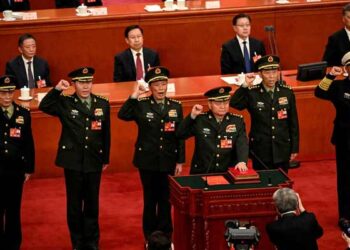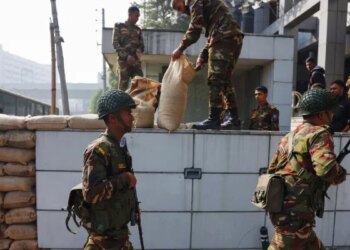Select Language:
WASHINGTON: On Thursday, the Inspector General’s office at the Pentagon announced it is launching an investigation into Secretary of Defense Pete Hegseth’s use of an unclassified commercial messaging app to manage the sensitive US military strikes against Yemen’s Houthi forces on March 15.
In a memorandum to Hegseth, the Inspector General’s office stated it will assess whether his use of Signal adhered to Department of Defense guidelines, particularly those concerning classified materials.
Hegseth has consistently claimed that no classified information was compromised in the chat, despite including specific timings for the airstrikes and sensitive targeting information, usually kept secret for operations like the one conducted in Yemen.
The contents of the chat were disclosed last week by The Atlantic after its editor, Jeffrey Goldberg, was inadvertently added to the discussion, resulting in an embarrassing situation involving top national security officials from President Donald Trump’s administration.
This incident has brought renewed attention to Hegseth, who faced a challenging path to Senate confirmation amid significant concerns surrounding his qualifications, temperament, and perspectives on women in combat roles.
According to Steven Stebbins, the Acting Inspector General, “The purpose of this review is to ascertain how well the Secretary of Defense and other Department of Defense personnel followed the established policies for using a commercial messaging app for official purposes.” He further noted they would evaluate compliance with classification and record retention protocols.
Hegseth communicated plans to eliminate a Houthi militant leader just two hours prior to the military operation, detailing the launch times of F-18 fighter jets and sea-based cruise missiles.
‘Clean on OPSEC’
His messages initiated with “TEAM UPDATE” and revealed the following details, as reported by The Atlantic:
“TIME NOW (1144 ET): Weather is FAVOURABLE. Confirmed with CENTCOM we are a GO for mission launch.”
“1215 ET: F-18s LAUNCH (1st strike package).”
“1345: Trigger-Based 1st Strike Window Starts (Target has been spotted at his location, should be on time – also, Strike Drones Launch (MQ-9s)).”
“1410: Additional F-18s LAUNCH (2nd strike package).”
“1415: Strike Drones on Target (this is when the first bombs will definitively drop, pending earlier Trigger-Based targets).”
“1536: F-18 2nd Strike Starts and the first sea-based Tomahawks are launched.”
At the conclusion of the text chain, Hegseth assured that the mission was “clean on OPSEC”—referring to operational security—claiming there were no leaks, even with the journalist included in the thread.
If Houthi leaders had been aware of the impending attack, they could have evacuated to more densely populated areas, making targeting more problematic and potentially increasing civilian casualties to unacceptable levels.
Senator Jack Reed, the leading Democrat on the Senate’s Pentagon oversight committee, remarked that a leak could endanger US pilots.
“The potentially devastating outcomes from Secretary Hegseth’s mistake are alarming,” Reed stated. “If the information in his messages had fallen into the hands of the Houthis or any adversary, it would have enabled them to transfer weaponry to accurately target our pilots.”
Amid these sensitivities, the US military’s Central Command has disclosed far fewer details regarding ongoing operations in Yemen than usual, including basic statistics like the number of strikes conducted.
When inquired about the campaign launched on March 15, a defense official, who spoke on the condition of anonymity, told Reuters, “CENTCOM will not share details regarding strikes until the operation is fully completed and there are no additional risks to US personnel or assets.”
Stebbins noted that the investigatory review will be conducted both in Washington, D.C., and at Central Command headquarters in Tampa, Florida.
“We request that you appoint two points of contact for this evaluation within five days,” he stated in the memo, which was also addressed to Hegseth’s deputy, Steve Feinberg.
It is uncommon for the Inspector General’s office to investigate a Secretary of Defense; however, it notably probed Hegseth’s predecessor, Secretary of Defense Lloyd Austin, concerning his undisclosed hospitalization last year.
Stebbins was appointed as the acting Inspector General in January after Trump dismissed the previous head of the Pentagon’s independent watchdog as well as others across the government in his first week in office.






